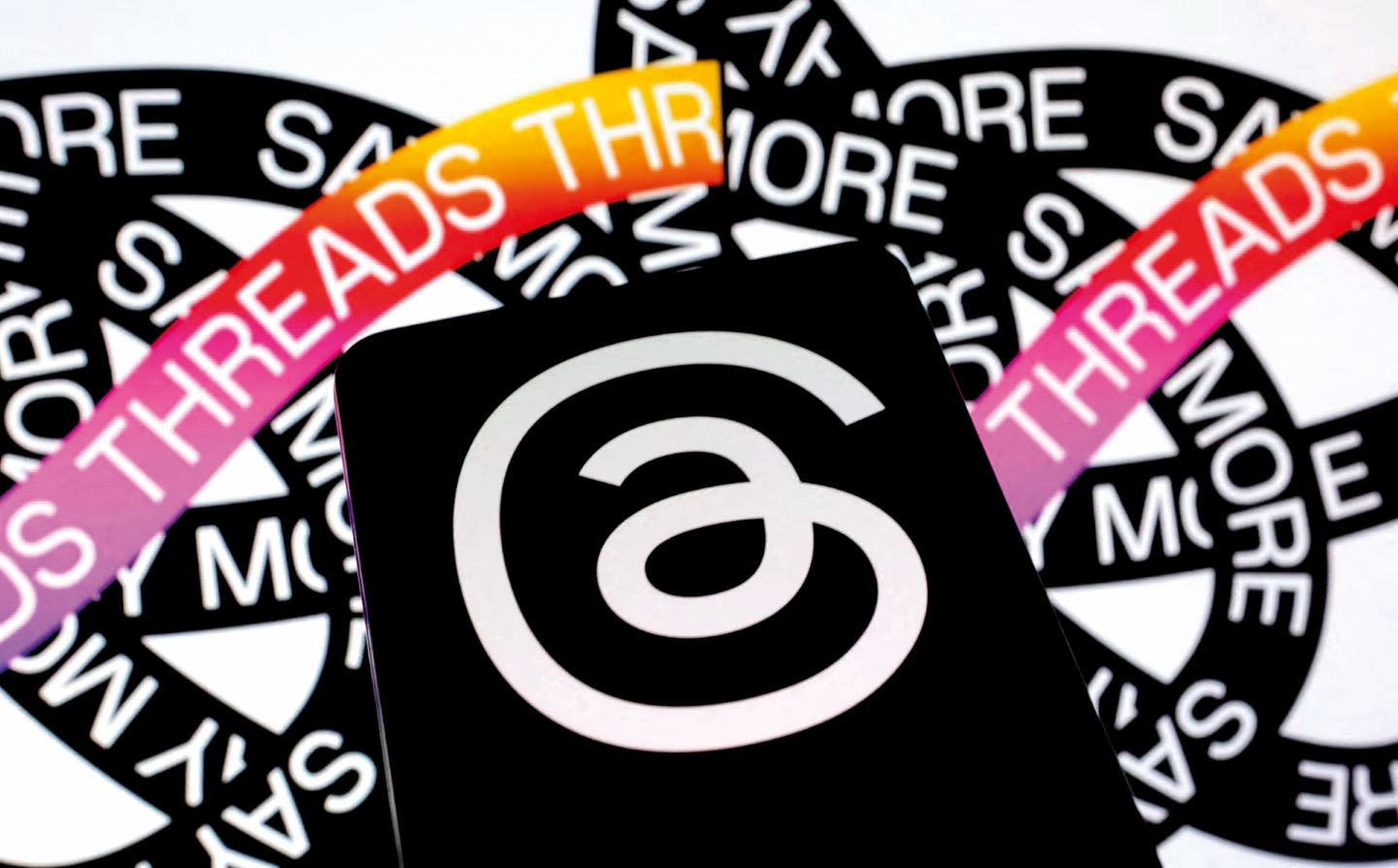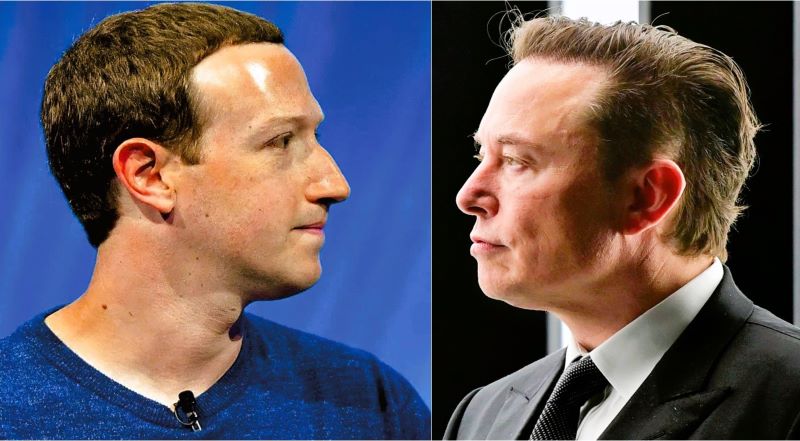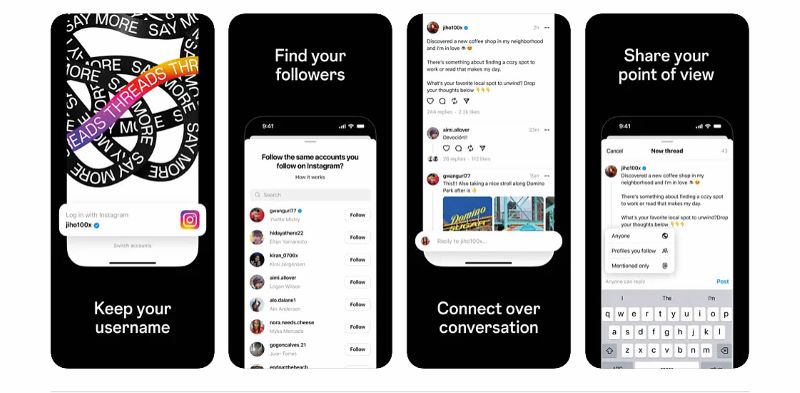
Threads joins the digital saga of clone wars (Photo: Threads)
When Meta founder Mark Zuckerberg recently jockeyed to combat, with his literal human limbs and body, Tesla’s head honcho Elon Musk in an actual cage match, the world was in stitches. People love a good fight between two dubiously motivated titans, except maybe for Elon’s mother Maye, who tweeted her discouragement along with two frowning emojis. No one knows exactly who will prevail in this billionaires’ brawl for digital supremacy. But if you have downloaded the much-hyped Threads, Twitter’s reluctant doppelgänger that also promotes real-time online conversations, the losers are clear: us.
Co-founder of the bird-logoed app Jack Dorsey was not entirely wrong when he lambasted Meta’s recent venture (“We wanted flying cars, instead we got 7 Twitter clones.”) Threads is the latest flavour to join a dizzying fruit punch consisting of silly names like Bluesky, Mastodon, Spill and Cohost — though none of these facsimiles of early-days Twitter have yet become the life of the party. Zuckerberg’s microblogging endeavour may bring excitement to a free-for-all shout fest and even a beacon of hope to journalists, politicians and content creators who previously benefited from a (decaying) platform for breaking news, but these feelings may be premature and short-lived. The grand ambition of weaving new patterns in a social media tapestry that has stopped evolving is once again rehashed, only to die over and over.
With great exhaustion, allow us to repeat how Threads works: Joining it requires an Instagram account, making signing up a breeze as you can auto-populate your profile with the same login and import followers immediately from the photo-sharing network. Opening the app reveals several buttons — like, repost, reply or quote a “Thread” — in addition to counters displaying the number of likes and replies a post has received. Unlike Twitter, which has a pithy 280-character threshold, its ad-free rival has a generous 500-character limit and can include links, photos and videos up to five minutes long.
mark_and_elon.jpg

Now, for some downsides and loose yarn that needs tying up: The lack of hashtags and a direct messaging function makes finding and communicating with like-minded groups a challenge (Instagram head Adam Mosseri said such enhancements are underway). Moreover, it is not quite easy to leave the app. While users can temporarily deactivate their profiles, they can only delete Threads by also removing their Instagram account. Its parent company, still beleaguered by muddied data privacy policies, freely collects personal information such as location, contact details, purchases and browsing history that can be monetised for unsolicited advertising and marketing positioning.
A select group of celebrities, brands and influencers were given prior access to tinker with the social media platform, a move by Meta to kick-start a “freewheeling culture of fun and discussion” contrary to the toxicity and erratic leadership that clipped the wings of its direct competitor. Reaching 100 million users in under a week, a staggering feat that will soon surpass Twitter’s audience base, the new challenger has courted a critical mass of politically and culturally influential figures such as Oprah Winfrey, Kim Kardashian, Gordon Ramsay, Jennifer Lopez, Bill Gates, Richard Branson and Jeff Bezos.
So far, early adopters have claimed the vibe is friendly and anodyne, both optimistic traits that align with Threads’ vision of toning down news and political content as they are, in the words of Mosseri, “not at all worth the scrutiny, negativity or integrity risks that come along with them”. But, really, isn’t disavowing politics a political move in itself? As virtuous as this digital nirvana strives to be, Threads’ feel-good nature does not absolve it of responsibility for the political and social repercussions it imposes on the widespread platform available in more than 100 countries.
threads_app_interfance.jpg

Whether you are a creator or a commentator, the biggest takeaway from a crowded microblogging fray, or in the case of Facebook, a social phenomenon rooted in hasty and sometimes unwanted friend requests, is that migrating to a new app is an arduous effort unless the interface is easy to use and addictively engaging. You remember good ol’ Twitter at its cultural pinnacle circa 2018, when it was not just a disseminator of commentary but an arbiter of your choice of memes. And before its subscription format turned into a point of derision, the app was credited with popularising hashtags, conduits that allowed people to participate in internet trends and propel first-hand stories to global attention. Harnessed for good, this communication shorthand in the parlance of social media expanded the set of niche voices we needed to hear through movements such as #BlackLivesMatter, #MeToo, #OscarsSoWhite, or #KitaJagaKita. And the world listened.
The reality that we are only a few algorithmic nudges away from a rabbit hole filled with conspiracies or that we have entrusted the most intimate parts of our digital lives to a surveillance machine appears daunting. But you can outsmart the Big Techs and even enjoy Threads with a few useful tips.
To rebrand yourself, experts recommend creating a persona that is unique from your Instagram, using your bio as an elevator pitch and showcasing what you can bring to the table. For those wielding it as a corporate launchpad, develop a professional narrative with a clear career bent that can resonate with recruiters or CEOs headhunting talents beyond LinkedIn. If you are tired of the dumpster fire that is Twitter, start afresh in the Meta app by providing solutions, sharing valuable insights and peppering these with personal storytelling alongside visuals to break the monotony of text. We say take inspiration from Netflix, which cheekily posted “Social media managers, y’all ok?” to address our technological overload and fatigue, duly followed by a GIF of Anthony Bridgerton stressing out.
But netizens are not the only frazzled ones. Twitter has been on pins and needles after the blockbuster launch of Meta’s big reveal, threatening legal action against it for unlawfully using trade secrets and other intellectual property by hiring former Twitter employees to create a “copycat” app. Musk also traded barbs on his US$44 billion (RM204.56 billion) platform by saying, “Competition is fine, cheating is not”.
Can Zuckerberg’s latest project, capitalising on the travails of its openly billed nemesis, take on the role of the new, trustworthy public square? It is still too early to tell but judging from the financial numbers and user growth trajectory, critics are certain this zealous newcomer will not sound the death knell for its cash-strapped twittering opponent. While principles and rules will help create a safer environment on an open platform, it is values that will ensure its longevity.
So, Threads carefully.
This article first appeared on July 17, 2023 in The Edge Malaysia.


